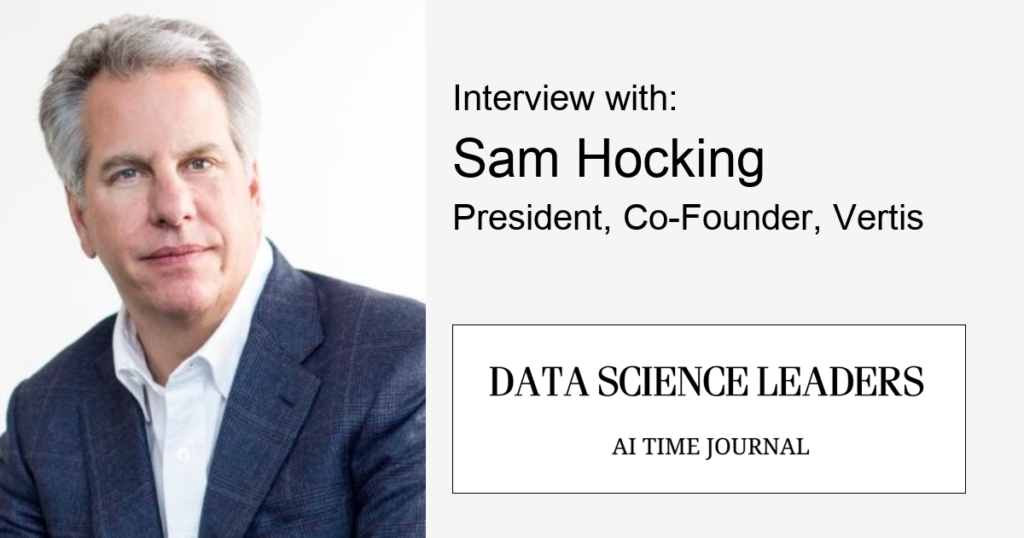
We thank Sam Hocking from Vertis for taking part in the Data Science Leaders interview series. It was an absolute pleasure and a great experience interviewing Sam and understanding multiple trends & happenings currently ongoing in the industry. Sam Hocking in this talk has shared several insights, including:
- Introduction about Sam
- Technology – then and now
- Journey into data Science & analytics
- Views on current AI trends and the future ahead
- Future of data science
- Industries that can be transformed using data science
- Recommendations for students and professionals
Please introduce yourself to us, and tell us how you feel about being in the industry for such a long time.
The demand for data and insights became paramount as clients and bankers alike were trying to better understand the risks in the market.
With the encouragement and backing of two of the professors at Harvard Business School, Marco Iansiti and Karim Lakhani, I left banking and founded AltX — a marketplace research manager and analytics platform for the private securities marketplace. AltX employed machine learning and AI to solve challenging data and distribution problems for the private market ecosystem. The Financial Times named AltX as one of the top 20 disruptors in 2015. I eventually sold Altx and started to think about the next transformation.
Tell us about your first job and what the work was about.
I started my career in broadcast media and spent 10 years working for various news channels, including ABC News and the BBC. I was lucky enough to work in the US, Russia, South Africa, the UK, Austria and Switzerland. I was in Europe in the early 90s during the transformation of the continent, I learned a great deal and had extraordinary experiences, including teaching at the college level. But I was incredibly curious about what was next and wanted to move back to the US for my next chapter. This experience working around the world for different broadcasters enlightened me about how the world is viewed differently, culturally, economically and politically and shaped me to look at problems differently, holistically.
How would you describe technology then and now?
The most interesting thing about technology is the speed at which it just gets better and how much less it costs to build
How did you venture into data science and analytics?
After journalism and academia, the start-up I joined was LAMP Technologies. What I learned there in hedge fund data led me to Bank of America where I led and managed teams in Prime Finance globally then we eventually sold to BNP Paribas. Banking is heavily steeped in broad technology but not as much into detailed AI data and analytics platforms for customers, which is where I saw a huge opportunity. And today, you can see the massive uptake of Fintech companies and disruptions. In 2010 people had not really heard the term Fintech or knew what it was, but running a large customer business as I did you, I started to see the signs.
What is your view on the current AI trends, and how do you foresee the future?
AI and machine learning are the future of every industry. What companies need to continue to focus on is how to use a data-driven approach to solving their problems. For real estate and HR professionals, AI is becoming more and more necessary, I’d say crucial in fact, given the societal shift we’re seeing in the world of work. We’re in the midst of a movement, the relationship between employee and employer has changed and the war for talent is immense.
Knowing where to open an office or Flexi-space, knowing what type of talent is available in a particular region or knowing what region people want to move to for whatever reason, is now invaluable. The great resignation is a result of people wanting and needing more flexibility, people realising that to work in tech or finance doesn’t mean having to work in New York or San Francisco. It’s a whole new world for employers and how they’ll navigate it, even take advantage of it, is with data analytics.
Do you think data science has a future 10-15 years down the line, or do you see it deteriorating? Thoughts on this.
Understanding data, relationships at speed and scale allows for deeper and multilateral analysis that leads to better decisions and better outcomes.
What industry sectors do you think can be transformed using data science and analytics?
What are your comments on the role and increasing importance of data science in the future of work?
Is there any space where data science doesn’t have an impact yet?
What are your recommendations for students and professionals who want to venture into the data science sector?
I think the key here is to work on your problem-solving skills, not necessarily coding skills. The talent in the future will need to use a more data-driven approach to solve challenging problems. They will need to be able to translate data into solutions and recommendations. For me, the greatest skill can be the simple art of asking questions. I learned in journalism how to ask great questions and really listen to the answer. Listen to what people are saying. It will lead to your next great question and help you become a problem solver.
In terms of studies, I am involved in mentoring lots of young people and I always encourage them to do double majors that are potentially different to each other. The contrast makes you more thoughtful and resourceful. Find a problem and see if you can solve it and demonstrate to people you can go from start to finish even on a small challenge. It shows patience and thoughtfulness. Qualities that are needed in every organisation.